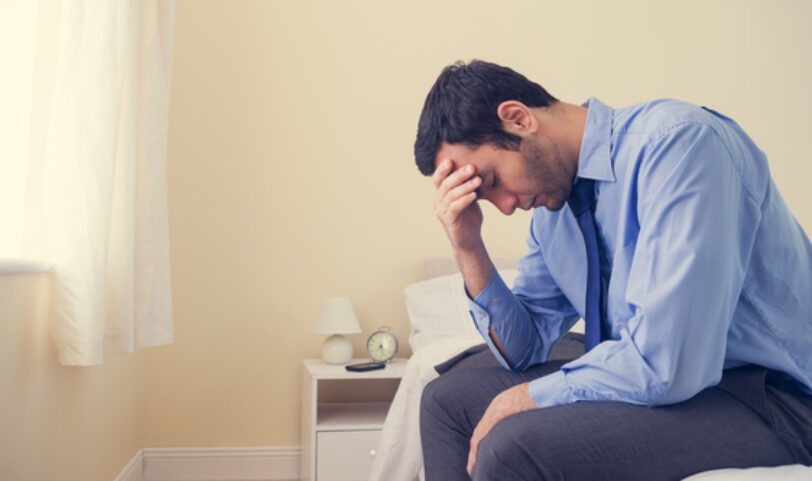
The difference between a panic attack and an anxiety attack can be very difficult to distinguish.
Your day is going great, and you are feeling fine. Then, out of nowhere, your chest tightens, your heart races, and you begin to feel overwhelmed with fear. Your breath starts to shorten, and you feel like you are losing control. Could this be an anxiety or panic attack? Are they the same thing or different?
While the terms panic attack and anxiety attack are sometimes used interchangeably, panic attack is the correct medical term. Having severe or frequent panic attacks is usually a sign of an underlying anxiety disorder. Left untreated, recurrent panic attacks and anxiety disorders can negatively affect a person's emotional, mental, and physical well-being.
Fortunately, panic attacks and anxiety disorders are very treatable. Knowing the common symptoms and signs to watch out for can make it easier for you to seek treatment when necessary.
What is a Panic Attack?
Sometimes referred to as an anxiety attack, a panic attack is an unexpected episode of heightened fear triggered by perceived threats rather than impending danger. Having a panic attack can be extremely frightening. Physical and psychological reactions can cause people to feel like they are losing touch with reality, experiencing a heart attack, or even dying.
While panic attacks can happen to anyone, they are often signs of an underlying anxiety disorder. If you are experiencing recurrent panic attacks that are interfering with daily life, contacting a mental health professional is recommended. Working with a mental health provider can help you manage symptoms and improve your overall quality of life.
Symptoms of a Panic Attack
The onset of a panic attack is usually sudden and without warning. They can happen at any time, whether you are in a public place, relaxing at home, with friends, or at work. A panic attack can result in a variety of physical and psychological symptoms and typically vary from person to person.
Symptoms of a panic attack may include one or more of the following:
- Extreme distress
- Feelings of impending doom or danger
- Shortness of breath
- Feeling detached from reality
- Tightness in your throat
- Rapid heart rate
- Sweating
- Hot flashes
- Fear of losing control or dying
- Shaking or trembling
- Chills
- Nausea
- Hot flashes
- Chest pain or tightness
- Abdominal discomfort
- Headache
- Feeling dizzy, lightheaded, or faint
- Tingling or numbness
Causes of Panic Attacks
While the direct cause of panic attacks is not fully known, a person's genetics, level of stress, personal temperament, and brain chemistry are all believed to play an important role. Although many people experience panic attacks with no clear warning, the following triggers are common:
- Major life transitions
- Stressful job
- Social situations
- Phobias, such as fear of leaving the house or being in a crowded space
- Remembering traumatic experiences
- Chronic illnesses like asthma or irritable bowel syndrome
- Chronic pain
- Withdrawal from alcohol or drugs
- Caffeine
- Certain medications
Risk Factors for Panic Attacks
Panic attacks occur in both men and women. While individuals of all ages may be affected, symptoms typically begin to develop during late adolescence or early adulthood. Having one or more of the following risk factors may also increase a person's likelihood of experiencing them.
- Having a family history of panic attacks or anxiety disorders
- Undergoing significant stress, such as losing a loved one
- Experiencing a traumatic event, such as warfare or sexual assault
- Going through a significant life change like divorce
- Having a history of childhood abuse
- Drug or alcohol abuse
When to Seek Help
Frequent panic attacks and anxiety can significantly disrupt your daily life. When this happens, you should consult a mental health provider. Mental health professionals can help manage your anxiety and diagnose underlying mental illnesses. They can also help you develop critical coping skills to move through life with greater peace of mind.
If you're unsure whether your symptoms require help, look out for the following warning signs:
- Your panic attacks are frequent and interfere with daily life
- Your panic attack symptoms last longer than 15 minutes
- You are experiencing physical symptoms, such as nausea, diarrhea, or sleeping problems, as a result of your anxiety
- You frequently experience extreme irritability
- You are avoiding people or places
- You are turning to alcohol or drugs to cope with your symptoms
A panic attack can also mimic symptoms of other serious health conditions, such as a heart attack. If you are not sure what's causing your symptoms, it's important to be evaluated by your doctor. If you are considering self-harm or suicide due to anxiety or panic attacks, seek help right away.
Treatment
Professional treatment is often necessary to reduce panic attacks and improve your day-to-day functioning. Psychotherapy and medications are the most common treatment options. Depending on the severity of your anxiety or panic attacks, your medical history, and the availability of mental health providers, one or both forms of treatment may be recommended.
Psychotherapy
Also known as talk therapy, psychotherapy can be an effective first-line treatment for panic attacks and anxiety disorders. Psychotherapy can help you better understand your panic attacks and learn important skills for managing symptoms. During therapy sessions, you will work with a licensed mental health professional who will guide you through various therapy techniques.
Panic attacks can be treated using the following techniques:
- Cognitive behavioral therapy (CBT): This form of therapy helps individuals identify, confront, and modify distorted thoughts related to panic symptoms. It also helps people learn how to manage triggers as they occur.
- Cognitive therapy: This technique can help you recognize, change, and/or eliminate negative thoughts that often accompany an anxiety disorder.
- Exposure therapy: During this type of therapy, patients are gradually exposed to a distressing trigger and are helped to overcome anxiety or stress when confronting their fears.
- Relaxation techniques: Working with a therapist can help you develop important relaxation skills such as deep breathing exercises, visualization, progressive relaxation, biofeedback, and autogenic training.
Medication
In some cases, medications may be prescribed to reduce symptoms associated with panic attacks and underlying mental health disorders. The following medications have been shown to be highly beneficial in treating panic attacks.
- Anti-anxiety drugs
- Antidepressants
- Beta-blockers
Relaxation Techniques for Panic Attacks
While it's important to consult a mental health professional if your panic attacks become frequent or severe, there are things you can do during the day to reduce your anxiety.
Whenever you feel anxiety or panic coming on, follow these relaxation tips:
- Take slow, deep breaths: When panic sets in, slow down your breathing and concentrate on each inhale and exhale. Take deep breaths and fill your stomach with air on each inhale. Continue to do this until your breath slows.
- Acknowledge what you're experiencing: If you have ever suffered a panic attack, you know how challenging it can be. Remember that your symptoms are temporary, and everything will be alright.
- Engage in mindfulness: This technique can help you focus on the present. To practice mindfulness, engage your 5 senses to help you stay in the present moment.
- Use stress-relieving techniques: These may include visualization, journaling, muscle relaxation, listening to music, stretching, or taking a bath. Engage in something you find relaxing or enjoyable.
Lifestyle Change
Changing your daily habits can be helpful in reducing and managing symptoms of anxiety disorders and panic attacks. To get started, slowly incorporate the following lifestyle changes into your daily routine.
- Try to get eight hours of sleep every night.
- Take steps to identify and reduce sources of stress in your life.
- Engage in regular, moderate exercise.
- Take up meditation or yoga.
- Maintain a healthy diet.
- Find a support group for people suffering from panic attacks or anxiety.
- Consume less alcohol and caffeine
- Quit smoking and refrain from drug use.
Anxiety Care at CHE
While a certain level of anxiety can help us stay focused, alert, and motivated to solve problems, panic attacks and overwhelming feelings of anxiety can prevent us from actively participating and enjoying life. If panic attacks are affecting your ability to function, mental health treatment can help you regain control and help you manage symptoms more effectively.
CHE Behavioral Health Services offers effective and convenient care for anxiety, panic attacks, and anxiety disorders. Our mental health providers can help you discover the source of your panic attacks and help you develop important coping strategies for feeling more at ease.
For more information about anxiety disorders and treatment options offered by CHE Behavioral Health Services, please call 888-515-3834. We are ready to talk, and ready to listen.



